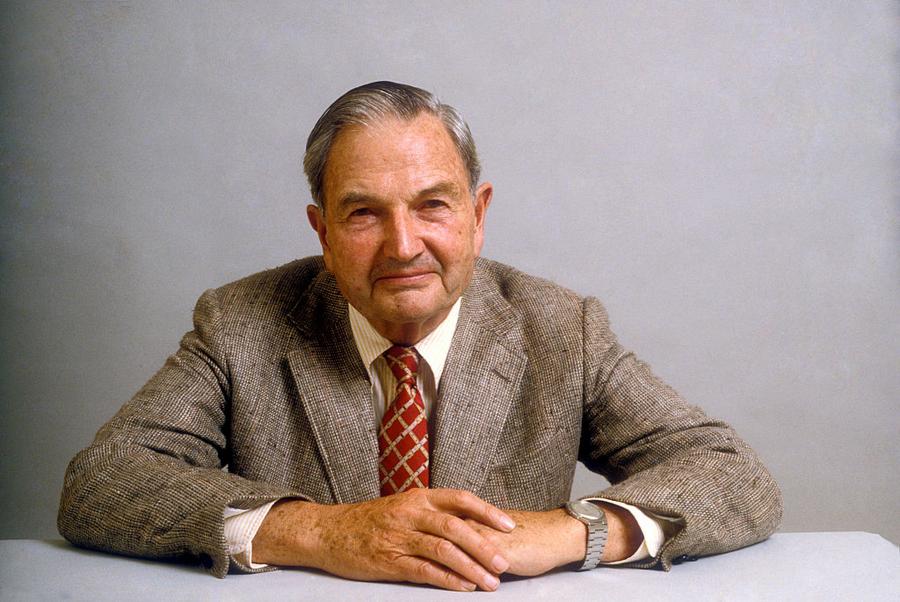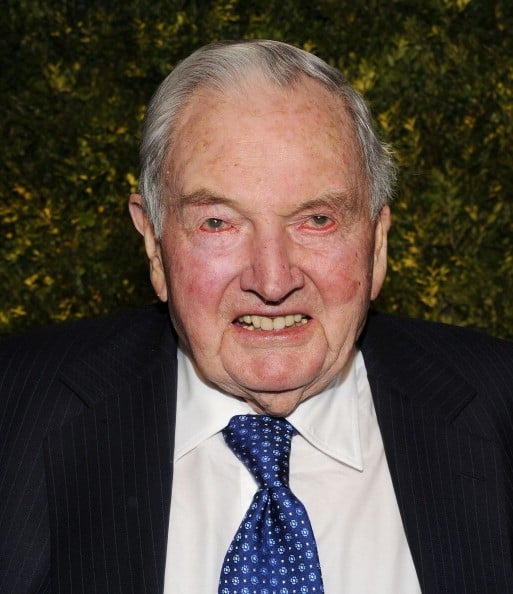What was David Rockefeller's Net Worth?
David Rockefeller was an American investment banker who had a net worth of $2.9 billion at the time of his death.
Before his death on March 20, 2017, at the age of 101, David was the oldest living member of the Rockefeller family. He was born on June 12, 1915 in New York City. His grandfather was John D. Rockefeller, the founder of Standard Oil and one of the wealthiest people in human history. At the time of death in 1937, John D. Rockefeller had an inflation-adjusted net worth of $340 BILLION. David's father, John D. Rockefeller Jr., developed Rockefeller Center in Manhattan.
David Rockefeller served as the chairman of the Chase Manhattan Corporation from 1969 to 1981. The fifth son and youngest child of John D. Rockefeller Jr. and Abby Aldrich, he was the oldest living member of the third generation of the prominent Rockefeller family. Beyond his business career, he was known for his many political connections, international travels, and philanthropic endeavors.
Early Life and Education
David Rockefeller was born on June 12, 1915, in New York City as the fifth son and youngest of six children of John D. Rockefeller Jr. and Abby Aldrich. His siblings were Abby, John III, Nelson, Laurance, and Winthrop. The kids' paternal grandfather was business tycoon John D. Rockefeller Sr., whose wife was Laura Spelman. As a youth, David Rockefeller was educated at the experimental Lincoln School in Harlem. For his higher education, he attended Harvard University, from which he graduated cum laude in 1936. Rockefeller also studied economics for a year at the London School of Economics. Returning to the United States, he enrolled at the University of Chicago, where he obtained his PhD in 1940.

David Rockefeller (Photo by Shepard Sherbell/Corbis via Getty Images)
Government and Military Service
Following his graduation from U of C, Rockefeller became a secretarial intern to New York Mayor Fiorello La Guardia. After that, he served as assistant regional director of the US Office of Defense, Health and Welfare Services. In 1943, Rockefeller enlisted in the US Army; he was promoted to the rank of Captain in 1945. During World War II, he worked for military intelligence in France and North Africa and, for a period of time, served as an assistant military attaché at the American Embassy in Paris.
Chase Manhattan Bank
After the war, Rockefeller joined the staff of Chase National Bank, which had a longstanding association with his family; the chairman at the time was his uncle Winthrop W. Aldrich. Rockefeller started as an assistant manager in the bank's foreign department, where he financed international trade in such commodities as coffee and sugar. In 1955, Chase National merged with the Manhattan Company to become Chase Manhattan Bank and transitioned into consumer banking. Rockefeller went on to become the bank's president in 1960 and, at the end of the decade, became its chairman and CEO. Under his leadership, the bank reorganized as a bank holding company called the Chase Manhattan Corporation. Rockefeller served as chairman of the company until 1981 and as CEO until 1980.
During Rockefeller's tenure at Chase, the company expanded internationally to become a key entity in the global financial system. It also grew its influence over various non-financial companies. However, Rockefeller also oversaw the most troubled loans of any major bank, and in 1975, Chase was branded a "problem bank" by the Federal Reserve. During that time, the bank's earnings fell precipitously, but they later rebounded in a big way between 1976 and 1980, when they more than doubled. Rockefeller subsequently retired from active management of Chase in 1981 and was succeeded by his protégé Willard C. Butcher.
Political and CIA Connections
Due to his major social stature and frequent international travels, Rockefeller formed a plethora of political connections during his lifetime. He met with US presidents such as Dwight D. Eisenhower and Jimmy Carter, and foreign leaders such as Fidel Castro, Saddam Hussein, and Mikhail Gorbachev. Rockefeller was also close with Henry Kissinger, whom he named to the board of trustees of the Rockefeller Brothers Fund. Due to his numerous ties, Rockefeller was often criticized for befriending dictators in order to expand Chase's interests in their countries.
Rockefeller also had close connections in the CIA, including director Allen Dulles and his brother, Secretary of State John Foster Dulles. Additionally, he associated with CIA analyst William Bundy, former CIA director Richard Helms, and former agent Archibald Roosevelt Jr. Reportedly, Rockefeller was briefed extensively on covert intelligence operations by various CIA division chiefs.

Jason Kempin/Getty Images
Philanthropy
As a philanthropist, Rockefeller co-founded the non-profit International Executive Service Corps in 1964 to encourage private enterprise in developing nations. The following year, he founded the Americas Society to support economic integration in the Americas. In 1973, Rockefeller co-founded the Trilateral Commission in order to foster closer ties between North America, Western Europe, and Japan, and in 1979 he founded the New York City Partnership, a non-profit membership organization consisting of CEOs from the city's top corporate, entrepreneurial, and investment firms.
Later in his career, Rockefeller worked with his brothers on reorganizing the family's sundry business and philanthropic ventures. Following the deaths of his brothers, with the last passing away in 2004, he became the patriarch of the family. In 2005, Rockefeller gave $100 million to the Museum of Modern Art and another $100 million to Rockefeller University. He also made major contributions to Harvard University and Colonial Williamsburg. Moreover, Rockefeller pledged $225 million to the Rockefeller Brothers Fund upon his death, which would be used to create a fund supporting projects in health care, international trade, and sustainable development.
Real Estate
Rockefeller had his principal residence in Pocantico Hills, New York, on the family estate. He also had residences in Manhattan and Livingston, New York, plus a summer home on Mount Desert Island off the coast of Maine. Overseas, Rockefeller owned a large estate on Saint Barthélemy. Beyond his own residences, he had been a partner in various properties, including a resort development in the Virgin Islands, a cattle ranch in Argentina, and a sheep ranch in Australia.
Personal Life and Death
Rockefeller was married to environmental conservationist Margaret McGrath from 1940 until her passing in 1996. The couple had six children: David Jr., Abby, Neva, Peggy, Richard, and Eileen, all of whom are involved in various business and philanthropic endeavors, both in and outside the family business.
On March 20, 2017, Rockefeller died in his sleep from congestive heart failure at his home in Pocantico Hills, New York. He was 101 years of age.
/2023/09/David-Rockefeller.jpg)
/2020/03/john-d-rockefeller-1.jpg)
/2010/01/dimon.jpg)
/2009/09/Jay-Rockefeller.jpg)
/2021/05/colin-powell.jpg)
/2019/01/Nelson-Rockefeller.jpg)
/2020/07/mlp.jpg)
/2010/01/Deryck-Whibley.jpg)
/2020/07/jl.jpg)
/2010/01/GettyImages-183679600.jpg)
/2022/10/Anne-Murray.jpg)
/2014/09/Kim-Delaney.jpg)
/2009/11/Tim-Duncan.jpg)
/2023/01/lance-armstrong.jpg)
/2021/04/Sara-Gilbert.jpg)
/2025/03/Kelli-Ferrell.jpg)
/2010/05/Jaleel-White.jpg)
/2023/09/David-Rockefeller.jpg)
/2019/01/Nelson-Rockefeller.jpg)
/2017/03/David-Rockefeller.jpg)
/2019/02/GettyImages-537425654.jpg)
/2018/04/GettyImages-151869035.jpg)
/2018/05/GettyImages-931468460.jpg)
/2021/05/colin-powell.jpg)
/2020/03/john-d-rockefeller-1.jpg)